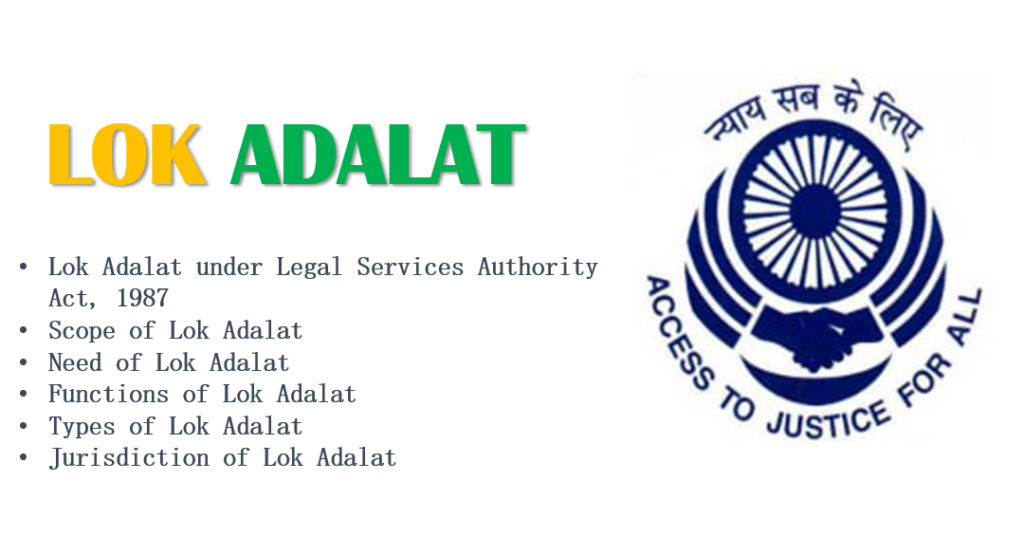
Lok Adalat
‘Lok Adalat’ is a system of conciliation or negotiation. It is also known as ‘people’s court’. It can be understood as a court involving the people who are directly or indirectly affected by the dispute or grievance. ‘Lok Adalat’, established by the government settles dispute through conciliation and compromise.
The First ‘Lok Adalat’ was held in Chennai in 1986. ‘Lok Adalat’ accepts the cases which could be settled by conciliation and compromise and pending in the regular courts within their jurisdiction.
Lok Adalat under Legal Services Authority Act, 1987
Section 19 of the Act provides for the establishment of Lok Adalats. Legal service authorities at all levels, including the central, state, and district levels, shall hold Lok Adalats. Lok Adalats serve as an alternate dispute resolution system. Their purpose is to settle cases that are pending or that have not been heard in the courts. It consists of judicial officers or an authorized person under the jurisdiction of the state, central government, or local government. Following the conciliation of disputes between the parties and the agreement of the parties, the award is handed down by conciliators in accordance with Section 21 of the Act. The award has the same legal effect as a court decision.
Scope of Lok Adalat
Unlike the Supreme Court, Lok Adalat is extremely broad to incorporate most of the cases pending before it as well as new cases that will be filed in the near future to be settled. The Lok Adalat does not have jurisdiction over cases relating to offences that cannot be compounded under any law. The Lok Sabha does not refer such matters to committees without giving the other party a reasonable opportunity to be heard. The Lok Adalat proceeds to resolve any case referred to it and tries to negotiate a mutually acceptable outcome between the parties involved with the case. Whenever a Lok Adalat decides a case before it, it adopts the most extreme efforts for a trade-off or settlement. The following points elaborate on the scope of Lok Adalats:
- If no settlement or compromise is reached by the parties after the Lok Adalat passes, no order is given.
- A reference will be sent automatically to the Court that drew up the reference for disposition. Those involved in the dispute are urged to seek redressal in courts.
- If the terms proposed by the bench do not satisfy the parties, the Lok Adalat cannot be forced to compromise or reach a settlement. Orders from Lok Adalats are definitive and restrict the parties.
- An order passed by a judge is a satisfactory means of stopping the proceedings that demand justice.
- Lok Adalats have enough powers under the Act to make justice without compromising the quality of their awards. The Lok Adalat’s final order is considered judicial since it is given the status of a decree.
- A Civil Court recognizes it as a form of evidence and is given the power to summon, discover, and get an affirmation.
In the case of P.T. Thomas v. Thomas Job (2005), the Apex Court specifically explained what Lok Adalat is. According to the Court, Lok Adalat is an ancient form of adjudicating system that once predominated in India, and its validity has not been questioned even today. According to Gandhian principles, the term Lok Adalat means “People’s Court”. It is an essential component of alternative dispute resolution. If the dispute is resolved at Lok Adala, there is no court fee, and if it is already paid, the fee will be refunded.
According to the case of B.P. Moideen Sevamandir and others v. AM Kutty Hassan (2008), the parties can communicate directly through their attorneys, which is far more convenient than speaking in a regular courtroom. Because Lok Adalats are dynamic, they are able to balance the interests of both parties and pass orders that both sides find acceptable.
Need of Lok Adalats
As we know that justice delayed is justice denied. This statement becomes true if we see the backlog of pending cases before courts of different hierarchy. It resulted into delay Justic in India. Mounting arrears of cases has brought judiciary and the judicial process at the verge of collapse. In this given state of affairs the mechanism of Lok Adalats is the only option left with the people resort to for availing cheap and speedy justice. Lok Adalats effectively deal with the magnitude of arrears of cases. ‘Lok Adalat’ has in view the social goals of ending bitterness rather than pending disputes restoring peace in the family, community and locality.

So ‘Lok Adalat’ is favorable to poor sections of the society.
Functions of Lok Adalat
The following are the functions of Lok Adalat:
- Lok Adalat members should be impartial and fair to the parties.
- Lok Adalat is responsible for handling pending cases in court. In the case of a Lok Adalat settlement, the court fee paid to the court on the petition will be reimbursed
- When filing a dispute with Lok Adalat, you do not have to pay a court fee.
Types of Lok Adalat
Lok Adalats can take the following forms:
- National level Lok Adalat
The Lok Adalat held at the national level is held regularly throughout the country at the Supreme Court level and taluk level, where thousands of cases are disposed of. Every month a different topic is discussed in this Adalat.
- Permanent Lok Adalat
The body is governed by Section 22B of the Act. There is a mandatory pre-litigation mechanism in Permanent Lok Adalat that settles disputes concerning public utilities such as transport, telegraph, postal service, etc. As a result of the case Abdul Hasan and National Legal Services Authority v. Delhi Vidyut Board and other (1999), the courts directed that permanent Lok Adalats be established.
Permanent Lok Adalats are charged with resolving public utility disputes quickly. Therefore, if parties neglect to show up at the settlement or compromise, then it has a further advantage of choosing the dispute based on merit. In this way, the possibility of postponement in the resolution of questions is eliminated. Rather than following the formal procedure for resolving disputes, it is bound to follow the principle of natural justice in order to save time.
- Mobile Lok Adalat
Mobile Lok Adalat is a method of settling disputes that travels from place to place. Over 15.14 lakh Lok Adalats have been held in the country as of 30th September 2015, and over 8.25 crore cases have been settled.
- Mega Lok Adalat
The Mega Lok Adalat is an ad hoc body that is constituted at the state level on a single day in all courts.
- Daily Lok Adalat
On a daily basis, these Lok Adalats are held.
- Continuous Lok Adalat
It is held continuously for a specific number of days.
Jurisdiction of Lok Adalats
Lok Adalats fall under the jurisdiction of the courts which organize them, thus, they cover any cases heard by that Court under its jurisdiction. This jurisdiction does not apply to cases regarding offences which are not compoundable by law and the Lok Adalats cannot resolve these cases. The respective courts may accept cases presented to them by parties concurring that the dispute should be referred to the Lok Adalat. The Courts may accept such cases in situations where one party makes an application to the court for the referral of the case to the Lok Adalat and the court might consider that there is a possibility of compromise through the Act.




0 Comments